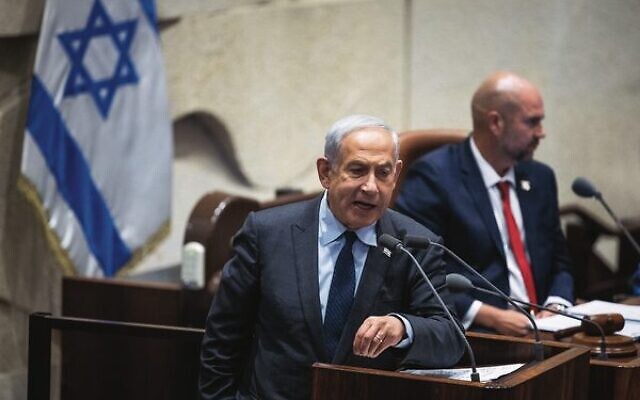Knesset summer session opens with slanging match
Shortly before Netanyahu made those remarks, Religious Zionism MK Simcha Rothman warned that the survival of the government depended on the overhaul being passed.
Just one day after the Knesset opened its summer session, a Monday debate deteriorated into a rowdy mudslinging match between the coalition and opposition over the government’s currently on hold plans to shake up the judiciary.
The Knesset convened for a so-called “40-signatures” debate. Opposition lawmakers had gathered the required number of signatures for the meeting, under the title of legislating a constitution for the country. Opposition MKs are calling for Israel to finally lay down a constitution based on its 1948 Declaration of Independence, as part of their opposition to the move to radically change Israel’s semi-constitutional Basic Laws under the overhaul plan.
In the end, the discussion ended up largely focusing on the overhaul itself, with each side accusing the other of being the obstacle to an acceptable resolution.
After insisting on his commitment to reaching a broad agreement on judicial reform in talks being brokered by President Isaac Herzog, the Prime Minister Benjamin Netanyahu attacked the opposition at the plenum, accusing it of being uncompromising in its position and thus thwarting efforts to reach an agreement on the divisive legislation.
“You talk only about dialogue, but at the talks say, ‘No, no, no, no.’ I would be happy to hear what you do agree to,” Netanyahu said.
Opposition leader and head of the Yesh Atid party MK Yair Lapid told Netanyahu that if he truly sought unity he would stop the plan and let the country’s political debates focus on issues the public wants to see addressed.
Critics of the plan say it will sap the High Court of Justice of its ability to act as a check and balance on parliament and the government. The government and its supporters say the legislation is needed to rein in an over-intrusive court. Herzog has been hosting talks to reach an agreement between government and opposition representatives at his official home in Jerusalem, but there has been no breakthrough.
Earlier, Opposition MK Benny Gantz told his National Unity faction there has been no progress in the negotiations over the overhaul.
At the start of his weekly cabinet meeting on Sunday, Netanyahu voiced support for the compromise negotiations. “With the goodwill of both parties, I am convinced that agreements can be reached – and I fully support this,” he said.
Shortly before Netanyahu made those remarks, Religious Zionism MK Simcha Rothman warned that the survival of the government depended on the overhaul being passed.
“The legal reform will pass – it is necessary for the survival of the coalition. And it’s not just me that thinks this, it’s also in the coalition agreements,” Rothman told Ynet.
Meanwhile, the High Court of Justice ruled on Monday that Netanyahu was not in contempt of court when he declared in March that he would get involved in the overhaul legislation, but ordered him to heed Attorney-General Gali Baharav-Miara’s instructions to stay out of the matter. The ruling came in response to a petition arguing Netanyahu was violating an arrangement that bars him from involvement in matters that could impact his trial on graft charges.
Last Thursday evening, tens of thousands of right-wing Israelis gathered in Jerusalem for a mass rally in support of the overhaul.
Estimates by news networks – citing figures by firms that specialise in estimating crowd sizes – generally ranged between 150,000 and 200,000 people in attendance at the rally, dubbed ahead of time by organisers as the “March of the Million”. Participants chanted, “The people demand judicial reform” and “No compromise, Bibi, don’t back down.”
The public backed the overhaul “in a referendum six months ago”, Justice Minister Yariv Levin told the crowds, in a reference to the election that brought the hardline coalition to power.
Netanyahu paused the legislation in March to allow time for talks, in light of countrywide protests by hundreds of thousands of Israelis who said the legislation would destroy Israeli democracy by removing critical checks on the power of the executive.
TIMES OF ISRAEL


comments